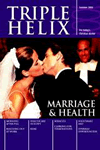The bulk of this book comprises a painstakingly detailed account of the sexual seduction of our society over the past two centuries by sexual revolutionaries from Robert Owen (1771-1858) to Gill Frances of the presentday National Children's Bureau.
It is a valuable resource book for specialist readers, tracing not only the key players but also highlighting their tactics - 'values clarification' replacing a Christian moral framework, promotion of adolescent sexual activity as a given norm, and the hijacking of terms such as 'family' to promote an overtly anti-marriage agenda. The sacrifice and personal suffering of those who dare oppose the sex education lobby also comes across very powerfully, especially in the chapter on Victoria Gillick.
Five major deficiencies of the book sadly minimise its impact however. First is the book's presentation and style. Excessive detail and page after page of dense text unbroken by subtexts or headings will put off all but the most determined of readers (or reviewers!).
Secondly, Dr Williams attacks his fellow Christians with the same apparent ease that he berates the sexual revolutionaries. Anyone who, like myself, knows the opprobrium and vitriol which the Family Planning Association (FPA) have poured upon those involved in developing CARE's sex education resources will recognise something is adrift when the author asserts, 'The British Government, the IPPF, the FPA, Brook and CARE all teach sex education in a framework that is either indifferent to, or ignores, biblical morality'. CARE is not alone in bearing William's wrath either - Oasis Trust, ACET, the Christian Institute and indeed every Christian organisation that I can think of trying to apply biblical wisdom meaningfully to sex education, is undermined by the author's failure to make any distinction between such groups and the sexual revolutionaries they oppose.
Thirdly, there is an element of implicit coercion in the book, which demonises choice. On numerous occasions, Williams castigates all who seek to help young people make 'informed choices'. He sees choice as an unbiblical concept per se. What then are we to make of God himself offering his people a choice between life and death and who does not makes their choices for them? (see Deuteronomy 30:19, Joshua 24:15). Surely it is better to use opportunities to inform young people about the joys of sex within marriage and the dangers of sex outside it, than to leave the field to those who will feed them the entirely opposite information that Dr Williams so rightly condemns? We cannot compel others to obey God's law.
There are also some disturbing inconsistencies in the book. For example, whilst others are chided for using medical and health reasons for promoting abstinence rather than quoting the Bible, the author himself gives many pages to explaining the failures of condoms and the havoc wrought by sexual infections and unplanned pregnancies. Quoting the Bible and using pragmatic arguments are not mutually exclusive - both are needed.
The greatest weakness of the book however is that after three hundred pages of criticism, the author has little hope to offer for anything better. A mere two pages at the end suggest that 'just as parents do not need to teach their children to walk or talk, for they learn these skills naturally as they grow older, so they do not need to teach children the details of sexual physiology, for children come to understand their sexual nature as they mature into adulthood'. I wonder if the author adopts the same 'head in the sand' approach about geography? We do need to teach our children about sex and we need to do it in a way honouring to Christ in a society that is increasingly hostile to biblical standards. The stark 'black and white' cover of this book suggests that the author lives in a world where everything is clear-cut. For those parents like myself, who need to find the Lord's help in many grey areas in bringing up our teenagers, this book will offer little practical assistance.































